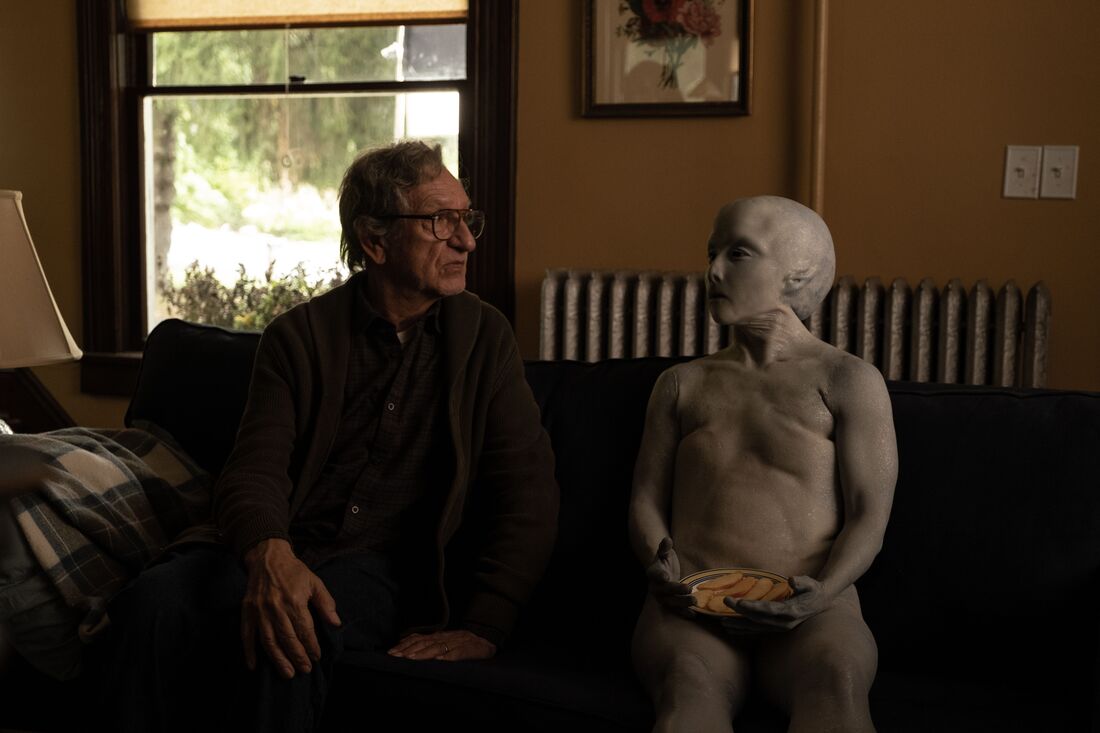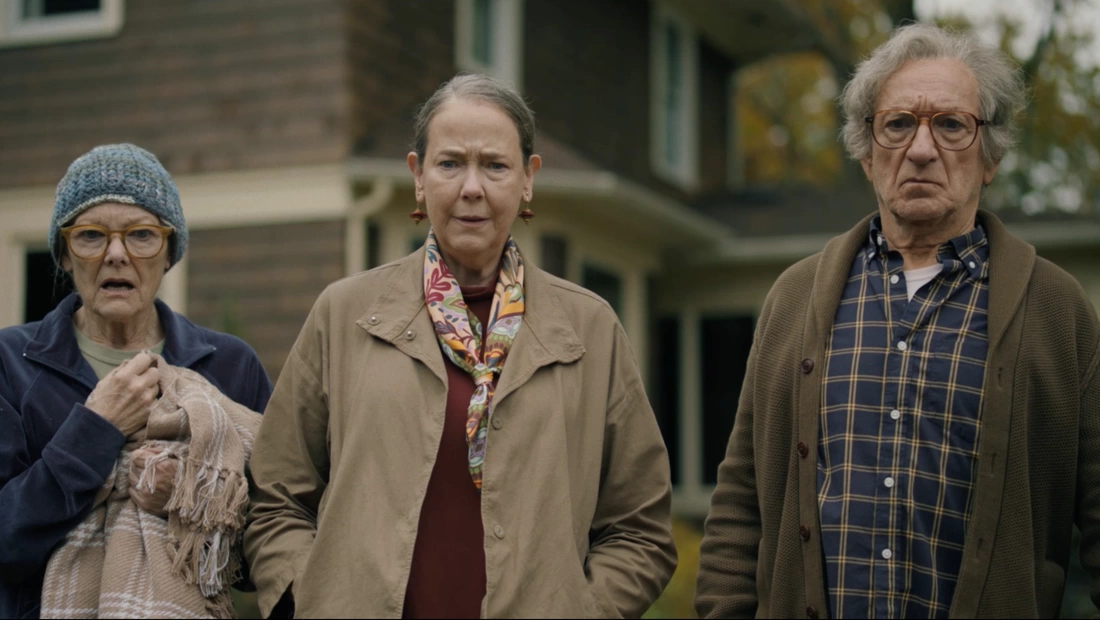|
Review by Daniel Lima At first glance, Jules looks like a charming, if milquetoast, indie dramedy about an old man bonding with an extraterrestrial life form. Though the narrative incorporates some decidedly strange elements, it is clear that director Marc Turletaub had no greater ambition than to make something charming and decidedly unchallenging. That steadfast refusal to embrace the weirdness inherent to the story, and the darkness that lies just underneath the surface, makes for a film that might be pleasant if it was not constantly gesturing toward a version of itself more textured and powerful. Ben Kingsley stars as an aging widower, whose twilight years are spent alone at home, occasionally journeying to the local town hall to complain about pressing issues like changing the town motto. His quiet, static existence is shattered by the arrival of a flying saucer in his backyard, and the small, mute alien that disembarks it. Their chance encounter forces Kingsley to consider what it means to be human, and the value of connecting with his fellow man. At least, that’s what you’d hope for. Every individual craft element of the film seems effortless, in the sense that no effort is being made to liven up the material. This is most obvious in the visual language, bland and inert as it is. Just about every shot is a simple medium, keeping everything the audience needs to see in frame and nothing more. Moments that should register as mysterious, wondrous, or perhaps even dangerous, such as the first sighting of the spaceship or Kingsley’s first contact with the alien, are instead flattened and robbed of any power they could have by workmanlike composition. Rendering the fantastic mundane might be compelling in and of itself, but Jules instead aims for the twee whimsy, as if it were a film seeking distribution at Sundance two decades ago. Nowhere is this more evident than in the score: light, bouncing, and ever-present, never failing to undercut any possible dramatic tension with the assurance that this story will never take a darker turn. Not only does this dull any sense of stakes within the narrative, it also makes the entire film one-note — an unceasing parade of cozy scenes that quickly grows stale. Not that this script needs help quashing any semblance of narrative stakes. There is no antagonistic force here, with every hint of one developing resolved before a given scene is over. A nosy neighbor pokes her nose into Kingsley’s affairs, only to prove a compatriot; shadowy government agents screen come knocking, only to turn away of their own volition. Not every story needs a villain per sé, but there ought to be momentum and a sense of purpose. Without anything actively challenging its protagonists, Jules never conjures that feeling. As limp and rote as the film’s aesthetic and narrative are, one might expect the bulk of the runtime to be spent exploring those characters, deepening our understanding of who they are, and providing its ensemble ample opportunity for fun performances. Confoundingly, there is only the scantest, most cursory examination of their inner lives. Kingsley himself receives the lion’s share, with a strained relationship with his children and the looming onset of dementia, but these never feel properly explored. Others make do with a single scene of backstory, or just their job. For their part, the actors do what they can with the material, but there’s nothing for them to build on.
This lack of definition is evident in the portrayal of Jules, the titular alien. With a blank expression, rarely conveying any emotion, the creature serves as a tabula rasa for the characters who meet it to project their own desires onto. Unfortunately, they are so ill-defined that what exactly it means to them is never conveyed. When someone says Jules has come to mean very much to them, it’s hard not to wonder why. That the alien's secret-keepers never stop arguing about what to name it — the being whose name is supposed to be the name of the film — is indicative of how amorphous the characters, the intended emotional core of the story, actually are. All this begs the question: what is this movie about? What is the central animating idea behind it, under its kitschy middlebrow veneer? The film never articulates a grand thesis. It gestures towards the kind of generic, feel-good message about human connectivity that you might expect from something so unambitious, but the lack of fully-realized characters or any meaningful conflict undercuts that attempt. With a story so deliberately light and airless, it’s ultimately impossible to lend it a sense of weight or importance. Teasing out some of the ideas raised in passing, however, hints at a far bleaker worldview. The film takes for granted that darkness is an inherent part of the human psyche, and that suffering is an integral part of the monotonous human experience. Family and friends are offered as reprieves from the inevitable pain one has to endure, but the film goes out of its way to practically vilify attempting to find another path through the torment. In a way, this fatalism is reflective of the film’s aesthetic values: any attempt to find something greater, be it in the twilight years of one’s life or in the realization of a story about a man and an alien. Dour and unpleasant as that may sound, this faint glimmer is the most interesting part of the movie. Scenes such as Kingsley reckoning with the prospect of his declining health, or a particularly odd moment juxtaposing a musical number with an outburst of violence (set to “Free Bird,” a possible reference to the similarly middle-of-the-road Forrest Gump), could offer far deeper and more insightful observations of the characters and the human condition than what the mediocre vision of the film allows for. Sadly, Jules is committed to adhering entirely to convention, both eschewing any exploration of the darker themes at its heart, and refusing to take any creative risks in bringing what should be a wholly unique story to life. Perhaps one could call the film a success, in that it achieves its own embarrassingly low aspirations. If so, it is a Pyrrhic victory, as it has consigned itself to be a mere shadow of what could have been. Jules hits theaters on August 11. Rating: 2/5
0 Comments
Leave a Reply. |
Archives
July 2024
Authors
All
|
|
|
disappointment media
Dedicated to unique and diverse perspectives on cinema! |


